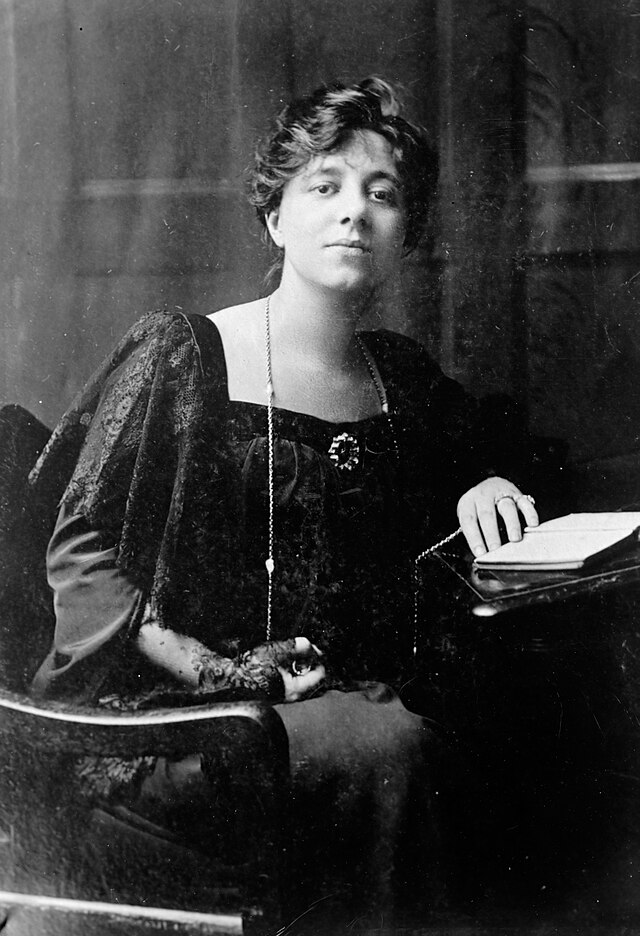Top Qs
Timeline
Chat
Perspective
Laurence Alma-Tadema
English writer (1865–1940) From Wikipedia, the free encyclopedia
Remove ads
Laurence Alma-Tadema CBE (August 1865 – 12 March 1940), born Laurense Tadema, was a British writer of the late 19th and early 20th centuries who worked in many genres.[1]

Early life
Alma-Tadema was born in Brussels in 1865. She was the eldest daughter of the Dutch painter Lawrence Alma-Tadema (1836–1912) and his first wife Marie-Pauline Gressin-Dumoulin de Boisgirard.[2] Laurence lived in the cottage "The Fair Haven", Wittersham, Kent, and she involved herself with music and plays with the villagers and their children, going on to construct a building to seat a hundred people, used for musical concerts and plays, which she named "Hall of Happy Hours".[3] She mostly divided her time between a flat in Paris and her cottage in Wittersham.[4] She never married, and died in a nursing home in London on 12 March 1940.[1][5] Her stepmother, Lady Laura Theresa Alma-Tadema (1852–1909) and younger sister Anna Alma-Tadema (1867–1943) were noted visual artists.[6]
Remove ads
Literary work
Alma-Tadema's first novel, Love's Martyr, was published in 1886. In addition to her own collections of stories and poems, which she often published herself, Alma-Tadema wrote two novels, songs and works on drama; she also made translations. The Orlando Project says about Alma-Tadema's writing that the "characteristic tone is one of intense emotion, but in prose and verse she has the gift of compression".[1] She contributed widely to periodicals, notably The Yellow Book, and also edited one herself.[1] Some of Alma-Tadema's plays were successfully produced in Germany.[3]
Alma-Tadema's poem "If No One Ever Marries Me", written in 1897 and published in Realms of Unknown Kings,[7] saw performances as a song in the 21st century by Natalie Merchant on her double album Leave Your Sleep.[8][9] In 1900 it had been included in the musical score, The daisy chain, cycle of twelve songs of childhood by Liza Lehmann,[10] and in 1922 in the musical score Little girls composed by Louise Sington.[citation needed]
Remove ads
Political activities
Alma-Tadema had a close association with Poland. She was secretary of the "Poland and the Polish Victims Relief Fund" from 1915 to 1939. She was an admirer and long-term associate of Ignacy Jan Paderewski both as far as his music and political activities were concerned, notably on Polish independence.[5] Alma-Tadema maintained a correspondence with him from 1915 to the end of her life. Some of her papers are deposited with the Bodleian Library at the University of Oxford.[11] She was appointed CBE in 1918.[12]
American tour
Alma-Tadema, who had socialist leanings, travelled to America in 1907 to tour the country widely.[3] She gave a series of readings on the "Meaning of Happiness", which proved exceedingly popular.[3] She also spoke on the plight of the divided Poland and asked her audience to express their feelings for this cause.[13][14]
Bibliography
- Love's Martyr, Longmans, London, Green, and Co., (1886), hardcover, 208 pages; New York, D. Appleton (1886)
- One Way of Love: A Play (1893), Edinburgh : R. & R. Clark, 54 pages
- The wings of Icarus: being the life of one Emilia Fletcher, revealed by herself in I. Thirty-five letters, written to Constance Norris between July 18th, 188–, and March 26th of the following year; II. A fragmentary journal; III. A postscript, MacMillan New York and London, 1894
- The Crucifix, A Venetian Phantasy, and Other Tales, London, Osgood, McIlvaine & Co. (1895), 172 pages
- Realms of unknown kings, London, G. Richards, 1897
- The fate-spinner, London, E.B. Mortlock, 1900
- The Daisy-Chain (Liza Lehmann, L. Alma-Tadema, R.L. Stevenson and others) (1900)
- Songs of childhood, Wrotham, Kent, Herb O'Grace, 1902.
- Songs of womanhood, London: Grant Richards, 1903, hardcover, 117 pages
- Four plays, London, Green Sheaf, 1905
- Tales from my garden: three fairy tales, coauthored with Pamela Colman Smith, London, The Green Sheaf, 1906
- The meaning of happiness : a discourse, London, Elkin Mathews, 1909
- A few lyrics, London, E. Mathews, 1909
- Mother Goose Nursery Rhymes : Proverbs and Rhyme Games, illustrated by Charles Robinson, foreword by Laurence Alma-Tadema, Collins Clear-Type Press, London, c. 1910, hardcover, 208 pages
- Chopin. A discourse ... Translated from the Polish by Laurence Alma Tadema, Ignace Jan Paderewski, London, W. Adlington, 1911
- Pelleas and Melisanda and the Sightless Two Plays By Maurice Maeterlinck, translation by Laurence Alma-Tadema, Walter Scott Ltd., London, hardcover and G. Allen and Unwin, London {1914}
- Poland, Russia and the war, St. Catherine press (1915)
- A Child's Garden of Verses ... With an introduction by Laurence Alma Tadema. Illustrated by Kate Elizabeth Olver. by Robert Louis Stevenson; Kate Elizabeth Olver; Laura Theresa Alma-Tadema, London & Glasgow, : Collins' Clear-Type Press, [1927]
- Little bo Peep's Story Book, Laurence Alma-Tadema, John Lea, and others, Children's Press, London, hardcover
- A Gleaner's Sheaf. Verses., London: St. Martin's Press (1927)
- The divine orbit : seventeen sonnets, Wittersham [Kent], s.n., London, Printed by Finden Brown & Co., 1933
- Playgrounds (single poem)
Remove ads
Notes
External links
Wikiwand - on
Seamless Wikipedia browsing. On steroids.
Remove ads
